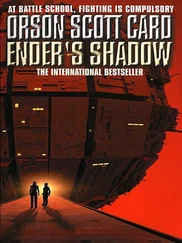Orson Card - Shadow of the Giant
Здесь есть возможность читать онлайн «Orson Card - Shadow of the Giant» весь текст электронной книги совершенно бесплатно (целиком полную версию без сокращений). В некоторых случаях можно слушать аудио, скачать через торрент в формате fb2 и присутствует краткое содержание. Жанр: Фантастика и фэнтези, на английском языке. Описание произведения, (предисловие) а так же отзывы посетителей доступны на портале библиотеки ЛибКат.
- Название:Shadow of the Giant
- Автор:
- Жанр:
- Год:неизвестен
- ISBN:нет данных
- Рейтинг книги:4 / 5. Голосов: 1
-
Избранное:Добавить в избранное
- Отзывы:
-
Ваша оценка:
- 80
- 1
- 2
- 3
- 4
- 5
Shadow of the Giant: краткое содержание, описание и аннотация
Предлагаем к чтению аннотацию, описание, краткое содержание или предисловие (зависит от того, что написал сам автор книги «Shadow of the Giant»). Если вы не нашли необходимую информацию о книге — напишите в комментариях, мы постараемся отыскать её.
Shadow of the Giant — читать онлайн бесплатно полную книгу (весь текст) целиком
Ниже представлен текст книги, разбитый по страницам. Система сохранения места последней прочитанной страницы, позволяет с удобством читать онлайн бесплатно книгу «Shadow of the Giant», без необходимости каждый раз заново искать на чём Вы остановились. Поставьте закладку, и сможете в любой момент перейти на страницу, на которой закончили чтение.
Интервал:
Закладка:
She couldn't believe she was a goddess. Alai was sure of that. Such superstitions would have been stamped out in Battle School.
Then again, Battle School was over years ago, and Virlomi had lived in isolation and adulation during most of that time. Things had happened that would change anybody. She had told him about the campaign of stones in the road, the "Great Wall of India," how she had seen her own actions turn into a vast movement. About how she first became a holy woman and then a goddess in hiding in eastern India.
When she taught him about Satyagraha, he thought he understood. You sacrifice anything and everything in order to stand for what's right without causing harm to another.
And yet she had also killed men with a gun she held in her own hand. There were times when she did not shrink from war. When she told him of her band of warriors who had stood off the whole Chinese army, preventing them from flooding back into India, from even resupplying the armies that Alai's Persians and Pakistanis were systematically destroying, he realized how much he owed to her brilliance as a commander, as a leader who could inspire incredible acts of bravery from her soldiers, as a teacher who could train peasants to be brutally efficient soldiers.
Somewhere between Satyagraha and slaughter, there had to be a place where Virlomi—the girl from Battle School—actually lived.
Or perhaps not. Perhaps the cruel contradictions of her own actions had led her to put the responsibility elsewhere. She served the gods. She was a god herself. Therefore it was not wrong for her to live by Satyagraha one day, and wipe out an entire convoy in a landslide the next.
The irony was that the longer he lived with her, the more Alai loved her. She was a sweet and generous lover, and she talked with him openly, girlishly, as if they were friends in school. As if they were still children.
Which we are, aren't we?
No. Alai was a man now, despite being in his teens. And Virlomi was older than he was, not a child at all.
But they had had no childhood. Alone together, their marriage was more like playing at being husband and wife than anything else. It was still fun.
And when they came to a meeting like this, Virlomi could switch off that playfulness, set aside the natural girl and become the irritating Hindu goddess that continued to drive a wedge between Caliph Alai and his most trusted servants.
Naturally, the counsel was worried about Peter Wiggin and Bean and Petra and Suriyawong. That Martel essay was taken very seriously.
So naturally, in order to be irritating, Virlomi dismissed it. "Martel can write what he wants, it means nothing."
Careful not to contradict her, Hadrubet Sasar—"Thorn"—pointed out the obvious. "The Delphikis really are in Armenia and have been for a week."
"They have family there," said Virlomi.
"And they're on vacation taking the babies to visit grandfather and grandmother," said Alamandar. As usual, his irony was so dry you could easily miss the fact that he was utterly scornful of the idea.
"Of course not," said Virlomi—and her scorn was not subtle. "Wiggin wants us to think they're planning something. We withdraw Turkish troops from Xinjiang to invade Armenia. Then Han Tzu strikes in Xinjiang."
"Perhaps al-Caliph has some intelligence indicating that the Emperor of China is in alliance with the Hegemon," said Thorn.
"Peter Wiggin," said Virlomi, "knows how to use people who don't know they're being used."
Alai listened to her and thought: That principle might as easily apply to the Armenians as to Han Tzu. Perhaps they're being used by Peter Wiggin without their consent. A simple matter to send Bean and Petra to visit the Arkanians, and then plant a false story that this means the Armenians are about to join the FPE.
Alai raised a hand. "Najjas. Would you compare the language in the Martel essays with the writings of Peter Wiggin, including the Locke essays, and tell me if they might be written by the same hand?"
A murmur of approval around the table.
"We will not take action against Armenia," said Caliph Alai, "based on unsubstantiated rumors from the nets. Nor based on our longstanding suspicion of the Armenians."
Alai watched their reaction. Some nodded approvingly, but most hid their reactions. And Musafi, the youngest of his wazirs, showed his skepticism.
"Musafi, speak to us," said Alai.
"It makes little difference to the people," said Musafi, "whether we can prove that the Armenians are plotting against us or not. This isn't a court of law. They are being told by many that instead of gaining India peacefully by marriage, we lost it the same way."
Alai did not look at Virlomi; nor did he sense any stiffening or change in her attitude.
"We did nothing when the Hegemon humiliated the Sudanese and stole Muslim land in Nubia." Musafi raised his hand to the inevitable objection. "The people believe the land was stolen."
"So you fear that they will think the Caliph is ineffective."
"They expected you to spread Islam throughout the world. Instead, you seem to be losing ground. The very fact that Armenia cannot be the source of a serious invasion also means that it's a safe place to take some limited action that will assure the people that the Caliphate is still watching over Islam."
"And how many men should die for this?" said Alai.
"For the continued unity of the Muslim people?" asked Musafi. "As many as love God."
"There's wisdom in this," said Alai. "But the Muslim people are not the only people in the world. Outside of Islam, Armenia is perceived as a heroic victim nation. Isn't there a chance that any kind of action in Armenia will be seen as proof that Islam is expanding, just as Martel charges? Then what happens to the Muslim minorities in Europe?"
Virlomi leaned forward, looking each of the counselors boldly in the face, as if she had authority at this table. Her stance was more aggressive than Alai ever showed to his friends. But then, these were not her friends. "You care about unity?"
"It's always been a problem in the Muslim world," said Alamandar. Some of the men chuckled.
"The 'Free People' can't invade us because we're more powerful than they are at any point where they might attack," said Virlomi. "Is our goal to unite the world under the leadership of Caliph Alai? Then our great rival is not Peter Wiggin. It's Han Tzu. He came to me with plots against Caliph Alai. He proposed marriage with me, so India and China could unite against Islam."
"When was this?" asked Musafi.
Alai understood why he was asking. "It was before Virlomi and I even considered marriage, Musafi. My wife has behaved with perfect propriety."
Musafi was satisfied; Virlomi showed no sign that she even cared what the interruption had been about. "You don't fight wars to enhance domestic unity—to do that, you pursue economic policies that make your people fat and rich. Wars are fought to create safety, to expand borders, and to eliminate future dangers. Han Tzu is such a danger."
"Since he has taken office," said Thorn, "Han Tzu has taken no aggressive action. He has been conciliatory with all his neighbors. He even sent home the Indian prime minister, didn't he?"
"That was no conciliatory gesture," said Virlomi.
"The expansionist Snow Tiger is gone, his policies failed. We have nothing to fear from China," said Thorn.
He had gone too far, and everyone at the table knew it. It was one thing to make suggestions, and quite another to flatly contradict Virlomi.
Pointedly, Virlomi sat back and looked at Alai, waiting for him to take action against the offender.
But Thorn had earned his nickname because he would say uncomfortable truths. Nor did Alai intend to start banishing advisers from his council just because Virlomi was annoyed with them. "Once again, our friend Thorn proves that his name is well chosen. And once again, we forgive him for his bluntness—or should I say, sharpness?"
Читать дальшеИнтервал:
Закладка:
Похожие книги на «Shadow of the Giant»
Представляем Вашему вниманию похожие книги на «Shadow of the Giant» списком для выбора. Мы отобрали схожую по названию и смыслу литературу в надежде предоставить читателям больше вариантов отыскать новые, интересные, ещё непрочитанные произведения.
Обсуждение, отзывы о книге «Shadow of the Giant» и просто собственные мнения читателей. Оставьте ваши комментарии, напишите, что Вы думаете о произведении, его смысле или главных героях. Укажите что конкретно понравилось, а что нет, и почему Вы так считаете.







